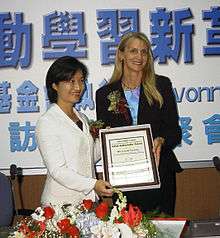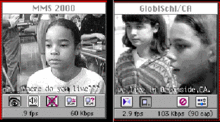Yvonne Andres

Dr. Yvonne Marie Andrés is an American educator who is recognized as an e-learning pioneer and visionary. Andrés is the co-founder of the non-profit Global SchoolNet (1984) and the founder of the Global Schoolhouse (1992). Andrés was named one of the 25 most influential people worldwide in education technology and was invited to meet with President Bush to launch the Friendship Through Education initiative (2000). Andrés is the creator and producer of International CyberFair and the US State Department’s Doors to Diplomacy program. Andrés frequently writes about highly effective education programs from around the globe that blend online and offline learning, while incorporating the latest neuroplasticity findings and Constructivist Learning methodology. Andrés has provided leadership throughout the US, Canada, Asia, Europe, Australia, South America and Africa and in 2007 Andrés was awarded the Soroptimist International Making a Difference Award for advancing the status of women and children. In August 2012 Andrés was selected as one of San Diego Magazine's Women Who Move the City, recognizing dynamic women who create positive change and contribute to the community.
Career
Dr. Yvonne Marie Andres is the President/CEO of (non-profit) Global SchoolNet, iPoPP: international Projects or Partners Place, and founder of the Global Schoolhouse.
Andrés began her career as a Title I teacher, school-based program coordinator, and technology mentor for the Oceanside Unified School District in Oceanside, California. Andrés has been a champion of online learning since 1984 as a project director for various networks, including AT&T Learning Network, CORE (California Online Resources in Education) Network, CERFnet (California Education Research Federation) and Free Educational Mail (FrEdMail).

Andrés co-authored "TeleSensations: The Educators' Handbook to Instructional TeleComputing" (1988) and served as editor of an international newsletter focusing on collaborative telecomputing. In 1992 Andrés developed and coordinated the original Global Schoolhouse Project for NSF, digitally bringing together youth from Tennessee, Virginia, California, and England to conduct an environmental watershed pollution study and share findings via state-of-the-art CU-SeeMe video conferencing using desktop computers and the Internet. CU-SeeMe was used by World News Now for the first television broadcast live over the Internet on Thanksgiving morning in 1995. WNN anchor Kevin Newman and Global Schoolhouse founder Yvonne Marie Andrés discussed the future of computers in communication.
Andrés wrote "CERF'n Safari: Educators' Guide to the Internet," the first teacher's Internet guide. In 1994 Andrés accepted an appointment to the Governor's Information Technology Council for California, where she co-authored "Getting Results." Andrés co-authored Cisco System's "Going to School on the Internet" and "Harnessing the Power of the Web for Classroom Use." Andrés wrote Apple's "Getting Started on the Internet." She was the executive producer of Dr. Jane Goodall’s first web site and Microsoft’s first education website.
(1999–2001) As Vice President of Programs and Partnerships for Lightspan (acquired by Plato Learning), Andrés was responsible for e-learning product development, online community development, event-driven usage, project management, brand development, and web site traffic growth.
Andrés serves (2009–2015) as the co-chair of the Youth and Education working group of the US-Russia Social Expertise Exchange (SEE). The program is implemented by Eurasia Foundation (USA) in partnership with the New Eurasia Foundation (Russia). The Education and Youth Working Group members encourage cross-cultural understanding among US and Russian youth; preparing young people of both countries to work collaboratively to solve or prevent global problems via student-centered methods such as education exchanges, seminars, and conferences. They foster a collaborative process among youth and education practitioners and share best practices among Russian/US education and youth-focused organizations by creating new partnerships and identifying innovative technology tools. The program will run through 2017.
In 2014 Andrés co-authored "CyberFair: Opening the Doors to Collaboration" and "School and the Community: Collaboration in the Context of New Educational Standards: Experiences of Russia and the United States." These two publications reveal successful models for collaboration among schools, nonprofit organizations, and businesses—in the context of the new educational standards in Russia and the United States.
Awards and Honors
- EdNet Hero Award, The Heller Reports, September 1995, Making a significant impact on education through technology.
- Top 30 Most Influential People in Education Technology, eSchool News, November 1999, Recognizing individuals who have improved education through the use of technology.
- Top 25 Technology Advocates, District Administration Magazine, December 2001, Recognizing innovators who improve how students learn.
- Global Ambassador Award, National Tsing Hua University, June 2002, In recognition of distinguished leadership and achievement for promoting international education in the Republic of China Taiwan.
- EdNet Hero Award, The Heller Reports, October 2003, Making a significant impact on education through technology.
- Advancing the Status of Women & Children Award, Soroptimist International, June 2007, Improving humanity by advancing the status of women & children.
- Readers Choice: Top 50 Ed-Tech Products, eSchool Media, January 2012, Recognizing products and services that are making a difference in schools.
- Women Who Move the City, San Diego Business Journal, August 2012, San Diego Magazine's Women Who Move the City award recognizes dynamic women who create positive change and contribute to the community.
- Women Who Mean Business Awards, San Diego Magazine, November 2012, recognizing dynamic women business leaders and role models, selected for their achievements and contributions to San Diego companies.
Literature
- CyberFair Implementation Guide: Opening the Doors to Collaboration, English 2014.
- CyberFair Implementation Guide: Opening the Doors to Collaboration, Russian 2014.
- School and the Community: Collaboration in the Context of New Educational Standards: Experiences of Russia and the United States, English 2014.
- School and the Community: Collaboration in the Context of New Educational Standards: Experiences of Russia and the United States, Russian 2014.
- TeleSensations: Educators Handbook Instructional Telecomputing 1988.
- CERF'n Safari: Educators' Guide to the Internet 1993.
- Going to School on the Internet 1996.